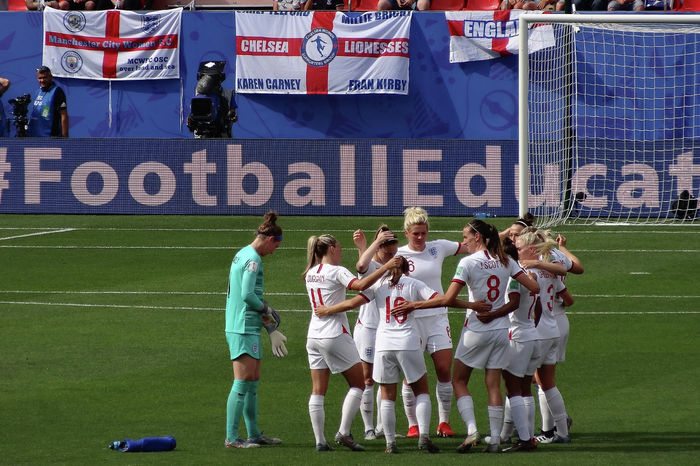Sky Sports Halo’s launch was a disaster: why are we still not taking women’s consumption of sport seriously?
Sky Sports’ new content channel aimed at female fans is being relentlessly condemned across the sporting world – and for good reason, writes Freya Compton

Just 3 days ago on Friday Sky Sports launched their new TikTok channel: Sky Sports Halo. But while it claimed to be a positive space for female sporting fans to enjoy, promoting women’s voices, it has quickly been slated for its utterly patronising, sexist portrayal of female sports fans.
From calling the channel ‘the little sis of Sky Sports’, to using pink glittery font in every video, and focusing on the personal lives of athletes and their WAGs, Halo has been a disaster. One particular video that has been criticised features a Haaland goal with the caption “how that matcha + hot girl walk combo hits,” garnering flabbergasted comments such as: “thanks for dumbing it down for me!;” “this gotta be a social experiment;” and “you know you don’t have to yassify it for us […] right?”. When fans pointed out that the attempt was demeaning, watering down sport for female fans, or focusing on the women connected to male athletes, the account responded “can’t believe you’re bringing this energy,” and doubled down on their methods. What’s next, explaining the offside rule using make-up?
It’s so shameless that it’s scarcely believable, at first leading fans question if it was even a legitimate account. So how on earth did an initiative like this get through the UK’s biggest sports provider platform? And are we overreacting to what is simply a misguided attempt at a good idea?
“What’s next, explaining the offside rule using make-up?”
Sky Sports is often praised for their balanced content, rarely missing the mark this dramatically. So it’s likely the episode began with a well-meaning idea from executives, asking for a new method to engage with young female fans, or an update to their social media outreach. The mistake comes when you ignore all that you know about sport-loving women and girls, and blindly bring in an agency known for producing high-performance content. But there’s a difference between weaving Gen Z referential humour into sports content, and flat out undermining any respect for sports fans – reducing their audience to brain-rot-loving giggly teens.
The age-old marketing example of King Charles and Ozzy Osborne is mirrored here; despite the pair being the same age, very wealthy, married twice with children, they seek out and consume radically different content. With Sky Sports Halo, assuming women to be a singular category of audience ignorantly overlooks the individuality of their following, displaying not only a clear lack of understanding of female fans, but an implicit hierarchy in the world of sport. There is no assumption that all men consuming sport content want the same videos, or that they need simplified, glamourised descriptions of core moments. Is this really where we are in 2025: is this something we are actually having to call out?
“The origins of the platform were so obviously entrenched in misogynistic hierarchies”
It’s not just a blatant lack of respect for the fan base that has been highlighted – it’s a fundamental problem with the way sports content is produced and organised. The entire concept of having a separate corner of the internet where female sports content can be shared and enjoyed implies that the main conduits are gendered in the first place. It pushes the responsibility of promoting women’s sport away from primary channels, legitimising unbalanced content while reinforcing the inferiority of female sport fans – shouting out at us: ‘this space is for you! (stay out of ours)’.
It’s an all-too-clear reminder that women’s sport content isn’t treated the same as men’s – it’s tiptoed around, pushed in and out of different strategised initiatives that maintain their fan base without truly trying to understand us. It’s not thought of neutrally – no matter what we’d like to believe, women are still sometimes treated as a new, mysterious audience to be conquered. And the result is the assumption that we want different content to men, that we need a distinct sphere for our content, and, as Halo’s videos on Charles Leclerc’s engagement and Lando Norris’ birthday’s demonstrate – that we aren’t interested in raw, complex sporting news and analysis.
Having gained this much traction for all the wrong reasons, proving that publicity isn’t always good publicity, it’s highly likely Sky Sports will have to backpeddle and issue an apology. Even if they manage to rebrand and recentre the channel on high quality women’s sport content, the origins of the platform were so obviously entrenched in misogynistic hierarchies that audiences will not forget this monumental blunder quickly.
 News / Judge Business School advisor resigns over Epstein and Andrew links18 February 2026
News / Judge Business School advisor resigns over Epstein and Andrew links18 February 2026 News / Hundreds of Cambridge academics demand vote on fate of vet course20 February 2026
News / Hundreds of Cambridge academics demand vote on fate of vet course20 February 2026 News / Petition demands University reverse decision on vegan menu20 February 2026
News / Petition demands University reverse decision on vegan menu20 February 2026 News / CUCA members attend Reform rally in London20 February 2026
News / CUCA members attend Reform rally in London20 February 2026 News / Gov grants £36m to Cambridge supercomputer17 February 2026
News / Gov grants £36m to Cambridge supercomputer17 February 2026










